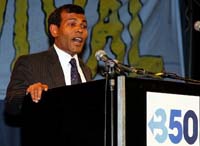Mohamed Nasheed
|
Learn more from the Center for Media and Democracy's research on climate change. |
Mohamed Nasheed is the President of the Maldives.
Contents
Speech at COP15
In a speech at the COP15 conference Nasheed said:
- "History shows us the power of peaceful protest. From the civil rights movement, to Gandhi’s Quit India campaign; non-violent protest can create change. Protest worked in the struggle for democracy in the Maldives. And on 24 October, we saw how protests across the world put Three - Five – Oh firmly on the Copenhagen agenda."
- "My message to you is to continue the protests. Continue after Copenhagen. Continue despite the odds. And eventually, together, we will reach that crucial number: Three – five – oh."
- "In all political agreements, you have to be prepared to negotiate. You have to be prepared to compromise; to give and take. That is the nature of politics. But physics isn’t politics. On climate change, there are things on which we cannot negotiate. There are scientific bottom lines that we have to respect. We know what the laws of physics say. And I think you know too."
- "The most important number in the world. The most important number you’ll ever hear. The most important number you’ll ever say. These three words: Three – five – oh. (Three – five – oh) (Three - five – oh)".[2]
Later at the same conference he stated that "Carbon concentrations higher than 350 parts per million, and temperature rises above 1.5 degrees, will submerge my country ... dissolve our coral reefs ... turn our oceans to acid ... and destabilize the planet’s climate. Anyone who says that agreeing these numbers is impossible, is also saying it is impossible to save my nation. This I cannot accept ... To make these 1.5 and 350 goals a reality, the IPCC states that global emissions must peak by 2015 and fall rapidly thereafter. The United States says it opposes the 350 target because the technologies do not exist to make it a reality. But I know there is no limit to American ingenuity. This is the country that first announced it would send a man to the moon, and then worked round the clock to build the Apollo spacecraft. Get the politics right, and the technology will follow."[3]
Support for the Copenhagen Accord
Following the negotiation of the controversial Copenhagen Accord, Nasheed defended the agreement. "If we had not achieved anything, it would have destroyed many things, including the relevance and legitimacy of the United Nations itself ... The accord has the potential to evolve into a clearly legally binding agreement within 2010. The accord contained important benchmarks, including keeping the global temperature rise within two degrees Celsius, a commitment by all countries to reduce emissions of greenhouse gases, and creating a fund for adaptation," he said.[4]
However, in a January 2010 speech at The World Future Energy Summit Nasheed was less upbeat. "The Copenhagen Accord, in its current form, will not prevent catastrophic climate change. Our challenge this year, and next, is therefore to strengthen the Accord so it becomes a blueprint for planet - saving action. Tackling climate change is not like dealing with other global issues, such as trade or disarmament. We do not have the luxury of time to meet, year after year, in endless negotiations. And the science of climate change means we cannot accept a watered down, minimalist treaty. After all, we cannot negotiate with the laws of physics. We cannot cut a deal with Mother Nature." He went on to reiterate his support for reducing global greenhouse gas concentrations below 350 Parts per million and limiting temperature increases to 1.5 degrees.[5]
In his speech Nasheed also claimed that the Accord would be strengthened. "But make no mistake: the vast majority of world leaders are determined to strengthen the Copenhagen Accord. When they do, market failures will be corrected and carbon pollution will be properly penalised. The cost of carbon intensive production will rise sharply over the coming decades," he said.[5]
Articles and resources
Related SourceWatch articles
References
- ↑ Messengers, 350.org, accessed December 12, 2011.
- ↑ "President Nasheed's Speech", 350.org, December 14th, 2009.
- ↑ Mohamed Nasheed, "Statement by President Nasheed to the Joint High-level segment of COP15 and CMP5 in Copenhagen", Government of Maldives, December 16, 2009.
- ↑ "President defends Copenhagen Accord", Government of the Maldives, Media release, December 21, 2009.
- ↑ 5.0 5.1 Mohamed Nasheed, "Address by President Nasheed at The World Future Energy Summit", Government of Maldives website, January 18, 2010.
External resources
External articles
| This article is a stub. You can help by expanding it. |

